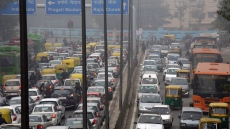The index of panic as per the IANS CVoter Covid Tracker has shot up in the week ending March 29 with more people, around 22 per cent, afraid that they or someone in the family can catch the coronavirus.
The index of panic has gone up sharply as compared to the tracker results for the week ending March 23. The survey is based on a sample size of 1,187 respondents. The field work for the survey was done on March 26-27.
The responses and trends come in a week after the national lockdown announced by Prime Minister Narendra Modi, cases in India crossing 1,000 and USA, Italy, Spain reeling under the crisis caused by the pandemic. All round, coronavirus is the single largest variable looming over people's lives across the world.
To a question on whether people are afraid that they will get the virus, 48.3 per cent agreed, a sharp increase of 9.2 per cent over last week. In turn, the number of people who disagree went down to 46.5 per cent from 59.5 per cent last week, a fall of 13 per cent which implies that less people now disagree with this formulation.
In the net effect, there is a 22 per cent shift towards people who agree that they are afraid they well get coronavirus.
Despite the index of panic going up, the trust in the government remains very high. The approval ratings of the Narendra Modi government's handling of the COVID-19 crisis have actually gone up to 74.1 per cent in this week compared to 70 per cent in the previous week.
As many as 83.5 per cent respondents agreed that the Indian government is handling the coronavirus crisis well while only 9.4 per cent disagreed which is down 4.3 per cent from last week.
In correlation to the index of panic going up, the index of complacency among the public has gone down.
The number of people now who agree that the fear of coronavirus is exaggerated is down by a massive 25.7 per cent compared to last week. In the current week, the number of people who agree with this proposition is down by 15.4 per cent compared to last week to 44.3 per cent while those who disagree has gone up by 10.3 per cent to 45.8 per cent clearly indicating that fewer people think that the fear is hyped.
However, with several life altering events happening over the last week including the national lockdown, the index of optimism is down by 3.3 per cent to 39.9 per cent respondents who think that the situation will get better over the next month.57.5 per cent of the respondents think the situation will get better while 17.6 per cent think it will get worse.
On becoming more aware about cleanliness, 87.2 per cent of the respondents said they yes, up by 15.7 per cent from last week.
The index of preparedness measures by how much rations/medicines or money for these essentials and for how many days is available in the house.
According to IANS CVoter Covid Tracker, 68.7 per cent have made stoked up for less than 3 weeks while 31.4 per cent are already storing essentials for more than three weeks.
On being asked if you are getting essentials at a higher price now, 60.9 per cent said yes while 28.7 per cent respondents said no.
To evaluate the lockdown follow up, it is largely considered to be successful with a net success rate of 71 per cent. 84.9 per cent of the respondents called the lockdown to be successful and said people are following the lockdowns and curfews around them, while only 13.9 per cent said it had failed.
The surprise of the survey is that despite so much of exposure to information about corona positive cases both in the country and abroad, as many as 89.3 per cent respondents said they have not seen any symptoms like fever, cough or cold among their family members or neighbours who they see on a regular basis.
In terms of dependence of corona related information on the media , there is a heavy skew towards the traditional media of newspapers and TV channels. At least 74.1 per cent respondents are dependent on the traditional media while 18.5 per cent are dependent on the social media and 5.2 per cent on community information while 67.9 per cent are dependent on TV channels for information related to coronavirus.
To a question in the survey whether the spread of virus and unsettling of the system is a message from nature, 46.7 per cent said yes while 30.6 per cent said no.

